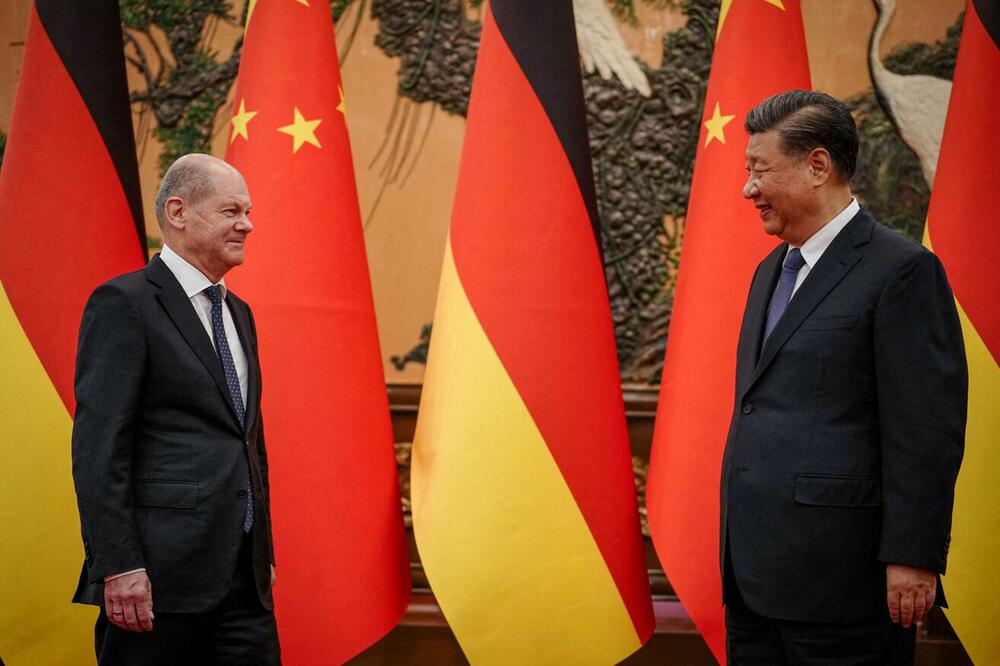German Chancellor Olaf Scholz's recent visit to China is an example of a do-it-yourself approach to foreign policy that can only benefit the Middle Kingdom.
There is an obvious division between Europe and the United States over how best to deal with China, a vast country that at various historical times has been called the Middle or Central Kingdom, implying its supposed superior role as the center of civilization or even the world.
However, the EU itself does not have a common approach, and China meanwhile is fighting the EU through its weakest - or most naive - members.
In recent years, this has happened through the 16+1 format, which includes China and 16 Eastern European countries that want to be its European vassals. When Greece joined, 16+1 became 17+1, but then the format began to unravel when Lithuania left, followed by Estonia and Latvia, and the Czech Republic said it was no longer an active member.
Then came Kovid-19 and Russia's aggression against Ukraine. No more summits were held, and the initiative probably came to an end.
The Belt and Road Initiative (BRI) is another Chinese initiative. The Greek port of Piraeus is among China's biggest acquisitions in Europe under the program, although critics say Beijing has failed to meet its contractual obligations to invest $300 million in port facilities.
More than a dozen countries of the European Union have signed the BRI. Beijing has financed numerous projects in the Western Balkans and Eastern Europe, including railway lines connecting Belgrade to Budapest.
Hungary was among the largest global recipients of BRI investments, but not all projects succeeded.
In 2014, Montenegro took a loan of one billion dollars from China for the construction of a new highway, which has remained unfinished to this day and has been called the "highway to nowhere." The debt - at that time more than a third of the annual budget of Montenegro - threatened the country with bankruptcy or surrender of part of its territory if it did not make repayments.
Italy was the only major Western country to sign up to the BRI but left it last year, with its defense minister calling the previous government's decision to join "terrible".
When the French president, Emmanuel Macron, visited China a year ago, he took with him the president of the Commission, Ursula von der Leyen. When President Xi visited Paris in March 2019, he was received at the Elysée by Macron, but the German Chancellor, Angela Merkel, and Jean-Claude Juncker, then President of the Commission, were also there.
Scholz left her countrywoman, von der Leyen, out of his delegation, possibly because Beijing sees her as a hawk in international relations and did not want to antagonize her hosts.
Overall, Foreign Policy described Scholz's visit as "conciliatory in tone and substance - an approach that leaves Germany, and therefore Europe, at risk of appearing alarmingly naive in the face of the economic and security challenges posed by China".
The New York Times wrote: "China hopes to drive a wedge between Europe and the United States by courting leaders like Mr. Scholz."
Scholz, accompanied by a bevy of CEOs from major German companies, including the auto industry, was reportedly eager to highlight Germany's commitment to doing business with China. And Beijing was eager to show that it welcomed the message.
Was it a coincidence that Germany was rocked by Chinese spy scandals a week after Scholz's visit?
Was it a signal that he should listen to his coalition partner and Greens foreign minister, Analena Berbock, who described Xi as a "dictator"? Does this confirm the assessment by human rights groups that his visit to China was a missed opportunity, because he did not mention the words "human rights"?
In many ways, Scholz's handling of Beijing is reminiscent of how his predecessor, Angela Merkel, dealt with Moscow, which led to increased use of Russian gas and a defiance that paved the way for a full-scale invasion of Ukraine.
Advocating for "open and fair" competition during his trip to China, the chancellor seemed unaware that Beijing was only engaged in power politics, writes "Le Monde".
And as for his reported attempt to get a commitment from Xi to participate in the International Conference on Ukraine planned for Switzerland in June, Scholz apparently came back empty-handed.
Xi Jinping is expected in Europe in early May, on his first trip there since the pandemic. It will stop at the two weakest points: Viktor Orban's Hungary and Aleksandar Vučić's Serbia.
The visit to Belgrade will probably fall on May 7, the 25th anniversary of NATO's accidental bombing of the Chinese embassy in Belgrade during the Kosovo war in 1999, which represents a major event in the relations between the two countries.
Xi will also visit France as Macron's ambitions to be Europe's true leader become more apparent. With a rival like Scholz, the bar is not very high.
Bonus video:





